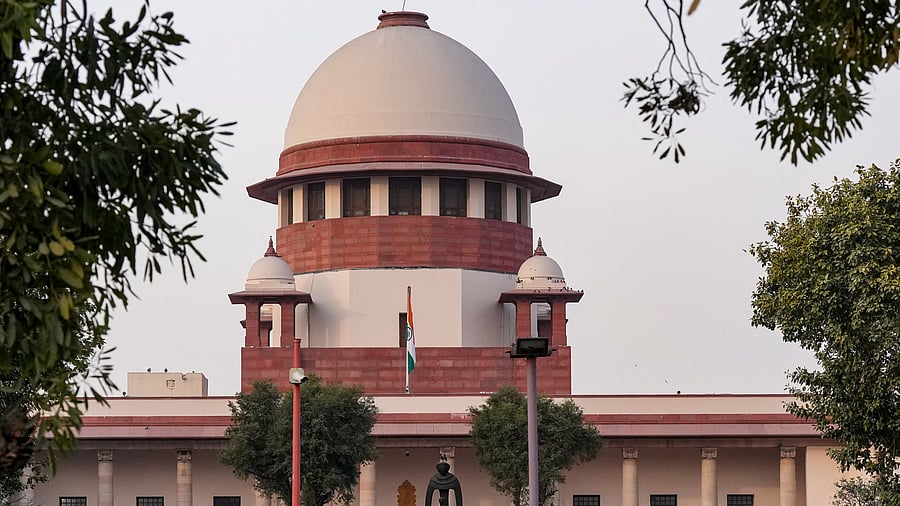
Supreme Court of India
Credit: PTI File Photo
New Delhi: The Supreme Court on Tuesday said that mere observance or performance of a ritual of or associated with any religion does not ipso facto and necessarily mean that the person ‘professes’ that religion.
It emphasised, adherence merely to some ritual of another religion would not tantamount to giving-up the original religion, unless the person concerned makes such belief explicit, it added.
A bench of Justices Abhay S Oka, Ahsanuddin Amanullah and Augustine George Masih allowed an appeal filed by A Raja, elected as an MLA on CPI-M ticket from Scheduled Caste-reserved Devikulam Legislative Assembly Constituency in Idukki District, Kerala in 2021.
The court set aside the Kerala High Court's 2023 judgment which held his election as void on a plea by an unsuccessful candidate, D Kumar that the winner had converted to Christianity.
It was contended that the appellant was born on October 17, 1984 to Antony and Esther. Antony and Esther, it was asserted, were Christians baptized by the CSI’s Church in Kundala Estate by a pastor named Ebenezer Mani in the year 1982. The appellant, born in 1984, also was baptized by the said Ebenezer Mani. Thus, the appellant was a Christian and not entitled to contest from a constituency reserved for the Scheduled Castes.
Examining his appeal, the court noted a duly issued caste or community certificate would be amenable to challenge only under the provisions of the statute concerned, and not in an election petition.
It pointed out no prayer was made in the election petition to set aside the caste certificate.
The court said the election petitions, including those wherein no allegations of corrupt practices are levelled, have to be treated akin to criminal proceedings and the election petitioner has to prove the charges levelled beyond reasonable doubt
The court also noted the records from the school where the appellant’s children studied showed them as members of the Hindu Parayan caste.
"In the present time, which is a day and age of intrusive media, including social media, where public figures, including Judges, politicians and bureaucrats are under constant public gaze, it is not easy to hide one’s religion or caste," Justice Amanullah wrote in a 63-page judgment for the bench.
The bench also opined production of some photographs or some rituals which may have been performed by the appellant, can, in no manner, take the place of evidence, especially when matters are being considered by the courts.
The bench said, the High Court, on the whole, accepted whatever was presented by the respondent and in such approach, disregarded and ignored the material lacuna in the pleadings of the election petition.
"As far as marriage rites are concerned, per se, assuming a practice associated with one religion was followed or observed, the same, ceteris paribus, would not mean the person ‘professes’ the said other religion," the bench said.
The respondent claimed the marriage of the appellant was conducted according to Christian rituals and customs. None of the Hindu rituals or customs were followed during the marriage function of the appellant.
The court, however, said, from the evidence available, it is not possible to hold that the appellant ‘professes’ Christianity.
The caste certificate issued in his favour by the competent authority till date hold the field. It has not been interfered with, either by the impugned judgment or by the authorities concerned, the bench noted.
The court also rejected evidence of Ebenezer Mani produced from the respondent’s side, who claimed to have baptized the appellant and his family.
It pointed out, during the evidence, he admitted that he was aged 54 years on the date of deposition, which meant he was aged only 14 years in the year 1982, when he purportedly baptized the appellant’s parents.
"This is, clearly, unbelievable and unsustainable," it said.
With regard to the claim that the appellant’s parents had converted to Christianity and the entire family, including the appellant, were baptized, the bench noted, in this regard, certain registers of the CSI Church were produced before the High Court.
However, from the evidence, it is also apparent that the entries in such registers were not very specific, inasmuch as the name of the appellant was not mentioned and other details with regard to the age of his siblings also did not match. Even some names of the siblings were different, the bench said.
"Were this an ordinary civil suit at trial, we could have possibly applied the ‘preponderance of probabilities’ yardstick, which may have resulted in some leeway and latitude in favour of the respondent and against the appellant," it said.
The bench found that there is no dispute on the factum that, originally, the grandparents of the appellant belonged to the Hindu Parayan caste in the erstwhile State of Travancore-Cochin having migrated from the State of Tamil Nadu but prior to 1950.
